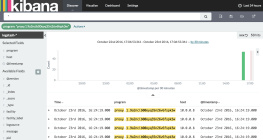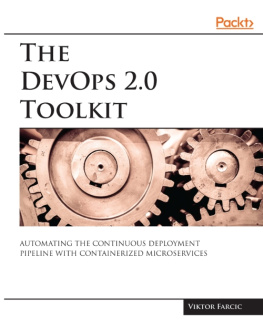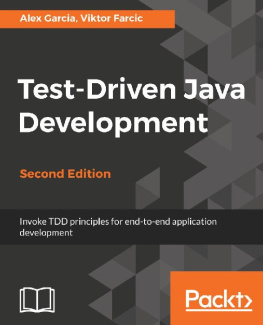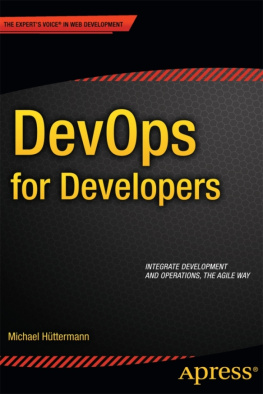This is a Leanpub book. Leanpub empowers authors and publishers with the Lean Publishing process. Lean Publishing is the act of publishing an in-progress ebook using lightweight tools and many iterations to get reader feedback, pivot until you have the right book and build traction once you do.
Introduction
Unlike my other books where I typically dive into a single tool or a single process, this time, I chose a different approach. Instead of going to great lengths trying to help someone become proficient in one thing, this time, I am trying to give you a quick introduction into many different tools and processes. We will skip the potentially lengthy discussions and in-depth exercises. What I want, this time, is to help you make decisions. Which tool works the best for a given task? What should we explore in more depth, and what is a waste of time? The goal is not to learn everything about a tool in detail but rather to dive into many concepts and a plethora of tools right away. The aim is to get you up-to-speed fast while producing useful real world results. Think of each chapter as a crash-course into something with the outcome that you can use right away.
I will assume that you dont have time to read hundreds of pages to learn something that you are not even sure is useful. Instead, I will guess that you got up to one hour to read a summary, and then decide if a tool is worthwhile a more significant investment.
This is a catalog of the tools, and the processes I believe are useful in this day and age. I will try to transfer what I think works well and what might have been the right choice in the past but is not optimal anymore.
Nevertheless, even if the scope of this book is different than others, some things are still the same. This is not a book with lots of theory. Sure, there will be some text you might need to read, but most of the content consists of hands-on exercises. I always believed that the best way to learn something is through practice, and I am not giving up on that. This is a book full of real-world hands-on examples, and each chapter will let you dive into a different tool or a process. At the end of each, you will be able to say, now I know what this is about, and now I can make a decision whether it is a worthwhile investment.
Think of this book as a catalog, combined with patterns and blueprints.
I Need Your Help
I will do my best to accommodate different needs. For example, if we need a Kubernetes cluster, you will find examples for at least a few flavors (e.g., GKE, EKS, AKS, Minikube, and Docker Desktop). If we need a cloud provider, there will be examples in at least the three major ones (e.g., AWS, GCP, and Azure). And so on and so forth. Nevertheless, there is always a limit to how many variations I can include. Yet, if you do feel that the one you are using is not represented, I will gladly add it (if I can). You just need to let me know.
While we are on the subject of including stuff, I prefer to drive this material by your needs. I want to hear back from you. What is the tool you would like me to explore? What did I miss? What are you interested in? Please let me know and, if that is something I feel confident working with, I will do my best to extend the material. This book will grow based on your feedback. The critical thing to note is that I want to keep it alive and to keep adding tools. But, I will do that only if you tell me to. So, its up to you to let me know what to add. And, to do that, you will need a way to contact me. So, here it goes.
Please join the DevOps20 Slack workspace and post your thoughts, ask questions, or participate in a discussion. If you prefer a more one-on-one conversation, you can use Slack to send me a private message or send an email to viktor@farcic.com. All the books I have written are very dear to me, and I want you to have a good experience reading them. Part of that experience is the option to reach out to me. Dont be shy.
If none of those communication channels work for you, just Google my name, and youll find others. Honestly, any way you prefer to reach me is OK. You can even send a courier pigeon.
Who Are We?
Before we dive further, let me introduce you to the team comprised of me, Viktor, and another guy, which I will introduce later.
Who Is Viktor?
Lets start with me. My name is Viktor Farcic. I currently work in Codefresh. However, things are changing and, by the time you are reading this, I might be working somewhere else. Change is constant, and one can never know what the future brings. At the time of this writing, I am a Principal DevOps Architect.
What else can I say about myself? I am a member of the Google Developer Experts (GDE), Continuous Delivery Foundation Ambassadors, and Docker Captains groups. You can probably guess from those that I am focused on containers, Cloud, Kubernetes, and quite a few other things.
Im a published author. I wrote quite a few books under the umbrella of The DevOps Toolkit Series. I also wrote DevOps Paradox and Test-Driven Java Development. Besides those, there are a few Udemy courses.
I am very passionate about DevOps, Kubernetes, microservices, continuous integration, and continuous delivery, and quite a few other topics. I like coding in Go.
I speak in a lot of conferences and community gatherings, and I do a lot of workshops.
I have a blog TechnologyConversations.com where I keep my random thoughts, and I co-host a podcast DevOps Paradox.
What really matters is that Im curious about technology, and I often change what I do. A significant portion of my time is spent helping others (individuals, communities, or companies).
Now, let me introduce the second person that was involved in the creation of this book. His name is Darin, and I will let him introduce himself.
Who Is Darin?
My name is Darin Pope. Im currently working at CloudBees as a professional services consultant. Along with Viktor, Im the co-host of DevOps Paradox.
Whether it is figuring out the latest changes with Kubernetes or creating more content to share with our listeners and viewers, Im always learning. Always have, always will.
About The Requirements
You will find the requirements near the beginning of each chapter. They vary from one subject to another, and the only constants are a laptop, Git, and a Bash terminal.
Im sure that you already have Git. If you dont, you and I are not living in the same century. I would not even mention it, if not for GitBash. If you are using Windows, please make sure that you have GitBash (part of the Git setup) and run all the commands from it. Other shells might work as well. Nevertheless, I tested all the commands on Windows with GitBash, so that is your safest bet. If, on the other hand, you are a macOS or Linux user, just fire up your favorite terminal.
Every chapter starts from scratch and ends with the destruction of everything we created. That way, you should be able to go through any chapter independently from others. Each is self-sufficient. That should allow you to skip the parts youre not interested in or to revisit others when in need to refresh your memory. An additional benefit of such destruction is that if you choose to run things in the cloud, you will not waste money when not working on the exercises.












